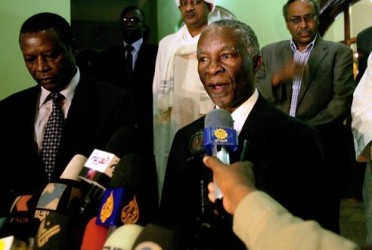Sudan, South Sudan delegations resume talks in Addis Ababa
September 4, 2012 (KHARTOUM) — Sudanese and South Sudanese delegates launched on Tuesday the last round of talks on the thorny outstanding issues relating to South Sudan’s secession, which the two parties have been discussing for over a year.

The meeting determined the issues that should top the agenda of the talks direct talks resume direct talks on Wednesday 5 September.
In statements following the meeting, South Sudanese cabinet minister Deng Alor expressed hope that the two sides will reach a final settlement of the unresolved issues between Juba and Khartoum. He stressed that the political atmosphere is ripe for reaching a comprehensive peace.
Alor underscored, however, that the settlement of outstanding issues requires a strong political will from both sides, saying the subjects of talks are well known by the two sides as they have been discussing them for more than ten years ago.
Alor was alluding to the Naivasha peace process that resulted in the 2005 Comprehensive Peace Agreement, which saw Alor’s SPLM share power with the regime in Khartoum for six years until South Sudan’s independence on 9 July 2011.
Besides the security arrangements and the issue of Sudan’s objection to the African Union map for a buffer zone along the north-south border, the two sides have to deal with border demarcations, the final status of the contested Abyei area, cross-border trade, and the status of nationals residing in both countries.
Zubeir Ahmed Hassan, head of the Sudanese side to the economic committee further said the remaining issues include; trade between the two sides, Sudan’s debit since before the separation of South Sudan. He said he expects an understanding on these issues will be reached within a short period if a breakthrough is reached in the files of border and security arrangements.
Last month the two parties struck a deal on oil transportation fees where Khartoum accepted to $9.10 for the oil of Upper Nile State and $11.00 for the oil of Unity State. Initially Sudan demanded $32 per barrel.
The mediation hopes the two parties will move quickly on the remaining issues as there is an urgent need for the hard currency generated by South Sudan’s oil exports in both Khartoum and Juba.
Alor reiterated Juba’s keenness to achieve stability with its northern neighbour but warned that his country will not offer any new concessions saying “we have made enough concessions.”
He said that this round will be the last if the parties succeed or fail to reach a final agreement to end their disputes. He pointed out that presidents Salva Kiir and Omer Al-Bashir will meet to sign an agreement or will be solicited by the mediation to resolve the issues that their delegation fail to agree on it.
In a presidential statement issued on 31 August, the UN Security Council urged Khartoum to accept “without further delay” an administrative security map to facilitate establishment of a demilitarised zone on the common border.
On Abyei, Juba still refuses to concede on the issue of the legislative council refusing to implement an agreement reached on 20 June 2011. Khartoum on the other hand refuses to withdraw a small police force from the Difra oil fields in the northern part of the disputed area.
Barnaba Marial Benjamin, South Sudan’s information minister told Sudan Tribune that Pagan Amum, Juba’s top negotiator is currently in the United States on a medical trip and is expected to join the rest of the team at a later date. Amum, the Secretary General of South Sudan’s ruling Sudan People’s Liberation Movement (SPLM), was still the head of the delegation, he said.
Michael Makuei, the South Sudan Parliamentary Affairs Minister will lead the delegation until Amum’s return, Marial said.
(ST)
